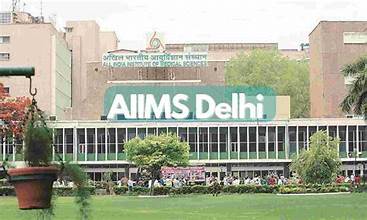The All India Institute of Medical Sciences (AIIMS) in Delhi has successfully treated its first stroke patient using an advanced stent-retriever device as part of the GRASSROOT trial (Gravity Stent-Retriever System for Reperfusion of Large Vessel Occlusion Stroke Trial). This clinical trial aims to evaluate the safety and efficacy of this cutting-edge device, which is designed to offer an affordable and accessible solution for stroke treatment across India.
What is the Stent-Retriever Device?
The stent-retriever is an advanced medical device used to retrieve blood clots from blocked arteries, thereby restoring blood flow to the brain. This process is essential in treating large vessel occlusion strokes, which are severe and can result in long-term neurological damage. Unlike traditional stents, this device extracts the clot directly, providing a more effective and rapid solution to stroke patients.
A Milestone in Stroke Treatment Accessibility
The GRASSROOT trial is being conducted across 16 centers in India, including AIIMS Delhi, JIPMER in Puducherry, and PGI Chandigarh. The trial aims to make advanced stroke treatment technology accessible to millions of Indians, many of whom suffer from strokes at a significantly younger age compared to their Western counterparts. This trial could potentially improve the overall outcomes of stroke treatment, making life-saving procedures more widely available and affordable.
Focus on Affordability and Efficiency
The goal of the trial is not only to prove the safety and effectiveness of the stent-retriever device but also to reduce the costs associated with stroke treatment. Dr. Shailesh Gaikwad, a key investigator from the Neuroimaging Department at AIIMS, highlighted that the new device is specifically designed to meet the unique needs of Indian stroke patients, addressing factors such as the types of blood clots commonly found in the population and the size of the arteries involved.
Positive Early Results
The trial, which began in August 2024, has already reported a successful treatment for the first patient, a 58-year-old man, who was discharged in stable condition. A second patient, a 67-year-old man, is currently undergoing treatment with the stent-retriever device and is under careful observation.
According to Dr. Deepti Vibha, one of the leading neurologists involved in the study, the trial represents a significant advancement in stroke care and has the potential to improve outcomes for thousands of patients in India.
Future Outlook
In India, approximately 17 lakh people suffer from brain strokes each year, with an estimated 3.75 lakh potentially qualifying for mechanical thrombectomy procedures. However, fewer than 5,000 patients underwent thrombectomy in 2023, indicating the limited availability of such treatments. With the successful implementation of the stent-retriever device, the GRASSROOT trial hopes to bridge this gap and ensure that stroke treatment becomes more accessible and affordable for a larger segment of the population.
Conclusion
The GRASSROOT trial is a promising development in the field of stroke treatment. It not only showcases the potential of innovative medical technology but also emphasizes the need for affordable healthcare solutions in India. As the trial continues, it is expected to pave the way for a future where more stroke patients can benefit from timely and effective interventions, improving the overall health outcomes in the country.






